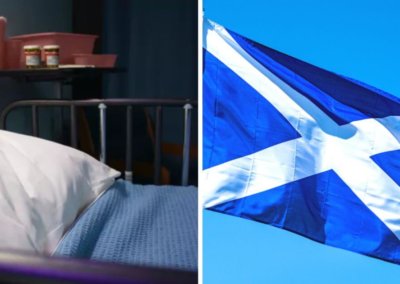The assisted suicide lobby has been caught peddling misinformation about the number of British people who end their lives in the assisted suicide clinic, ‘Dignitas’, each year, inflating the figure by over twenty times.
In a discussion on Sky News last week, a board member of the pro-assisted suicide lobby group, Dignity in Dying, Dr Jacky Davis, claimed that “over 600 people a year in this country [the UK] go to Dignitas, we are outsourcing assisted deaths at the moment”.
Exaggerated by 2,100%
However, speaking before the Health and Social Care Committee, which held a series of oral evidence sessions on assisted suicide earlier this year, a representative of Dignitas, Silvan Luley, said that over the past 20 years, 540 people from the UK had ended their lives in the Dignitas clinic.
This means an average of 27 people from the UK end their lives by assisted suicide per year in the Dignitas clinic in Switzerland. Davis’ claim that 600 people from the UK end their lives by assisted suicide in Dignitas each year is a 2,100% exaggeration.
When offered an opportunity to respond to her critic, Dr Gordan Macdonald of Care Not Killing, Dr Davis doubled down on her error.
She also claimed that 80% of people in the UK want an assisted dying law, a claim that is inconsistent with other polling from YouGov, which indicates the figure is 67%, and a separate poll conducted by Ipsos this year, which indicates it is 65%.
Furthermore, there is debate over whether there is actually widespread support for introducing assisted suicide in the United Kingdom.
Academics have been highly critical of the approach taken by Dignity in Dying with the polling that they have funded on assisted suicide, with two experts from the respected Institute for Social and Economic Research at Essex University saying that previous polling they commissioned on the issue was ‘skewed and ambiguous’.
“Assisted suicide” vs “assisted dying”
Polling from overseas shows that when the term ‘assisted suicide’ is used in polls, the majority in favour of introducing assisted suicide falls, sometimes by up to 19%.
Whether respondents to a poll are exposed to counterarguments to the introduction of assisted suicide also appears to have an impact on the percentages of respondents who state they support introducing assisted suicide. In one poll, undertaken by Savanta ComRes, of people in England, Scotland and Wales, support for assisted suicide dropped from 73% to 43% when respondents were presented with counterarguments. A poll that was run only in Scotland showed similar results.
Furthermore, polling in other jurisdictions suggests significant confusion concerning questions around assisted suicide and euthanasia. In 2020, a poll in New Zealand suggested that 80% of those who voted in the euthanasia referendum earlier that year misunderstood what the law would actually do.
According to group Euthanasia-Free NZ “Polling during the advance voting period showed that 80% of New Zealand adults were misunderstanding what the End of Life Choice Act would legalise”.
“Only 20% of respondents knew that this Act would not make it legal to turn off machines that are keeping people alive” [emphasis added].
Executive Officer of Euthanasia-Free NZ, Renée Joubert, said “It seems that most New Zealanders voted for an end-of-life choice that is in fact already legal”.
Right To Life UK spokesperson, Catherine Robinson, said “This gross exaggeration about the number of people from the UK who end their lives in Dignitas each year cannot go unchallenged. Fortunately, Dr Macdonald was able to point out this error during the discussion, but incredibly, the assisted suicide lobbyist doubled-down. This important debate is not helped by peddling such falsehoods”.











